Four Corners – An Interview with Lulu Kitololo

This month we focus on my hometown, London. As the first generation offspring of African-Caribbean parents born in the mid Sixties, I did not always find it easy to embrace my ‘Britishness’.
However, I’ve certainly never had any problems identifying myself as a “Londoner” – for London truly is the world within a single city.
Home to every conceivable nationality, this cosmopolitan metropolis pulses with its vibrant mix of cultures. And it is from this dynamism that the opportunity for new voices can emerge. New voices like those of Lulu Kitololo and her design company Asilia, whose work is not just resonating on these shores, but also beyond.
I have watched their work progress over the past few years with eagerness; appreciating its distinctly African roots whilst bringing a fresh modern approach and aesthetic.
It’s a design voice I really like, so let’s hear all about it from Lulu in her own words.
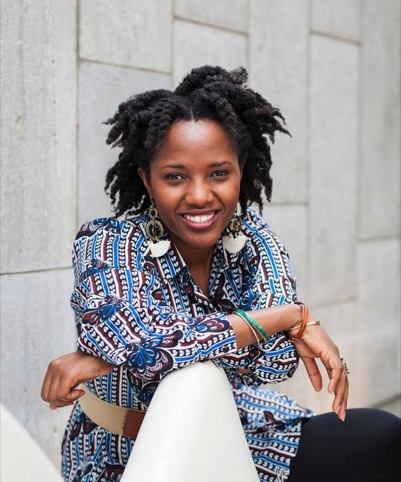
Source: Jonathan Perugia
Lulu Kitololo
What’s your background?
I was born and raised in Nairobi, Kenya. I was always creating things as a child – constructing shelters indoors when the weather was miserable; making trains for my dolls out of fruit cartons; experimenting with food in the kitchen; ‘refashioning’ my dresses (much to my mother’s dismay) and; of course, making images on paper. My parents were generally very encouraging of these pursuits but, being that I excelled at all subjects in school, I don’t think they – and many others – were fully prepared for the decision I made to pursue a creative profession.
I went to art school, Pratt Institute in New York, not quite sure what to specialise in and I ended up pursuing a Communications Design degree with a major in Advertising Art Direction. Thereafter, I worked for a couple of advertising agencies but something about it just wasn’t for me.
I ended up going back to school, this time to pursue a Masters in African Studies at SOAS, University of London. It was a fantastic year – learning about African politics, culture, film and literature. There were several interesting responses I experienced from people at that time including, “but you’re African, why do you need to study Africa?” and, “what are you going to do afterward?”
At the time, I had no idea what I was going to do afterward but I was very content with what I was doing and had faith that a path would reveal itself. I stumbled across a design job with a sustainability communications agency, Futerra, and it seemed a perfect opportunity to combine my creative expertise with my interest in development. I worked there for over 3 years and then left because I yearned for the freedom of self-employment. I’ve since gone into business with a friend and our creative agency, Asilia will be celebrating 3 years later this summer. It’s been an amazing journey, creating a niche for ourselves on the back of our distinctive style; our presence in both London and Nairobi and; our journey into creating products as well providing creative services. I’m very excited about what the future holds for us.
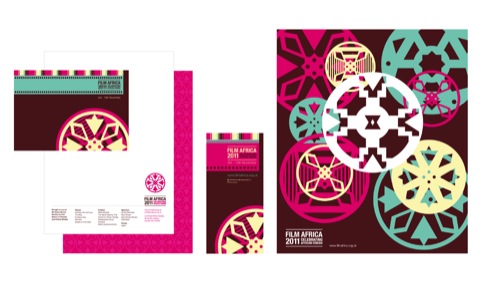
How did you get started in design?
The skills and knowledge I gained as part of my Bachelor of Fine Arts degree have been invaluable. However, the most significant thing I learned during those 4 years was not explicitly taught and that was – how to be resourceful.
I think resourcefulness and experience are great tools for any designer. Experience is something that comes with, well, experience. From my 2nd year of university, I was taking every opportunity to gain work experience in my field. This involved seeking out internships and volunteering my design services to people I came across who were doing things I was interested in.
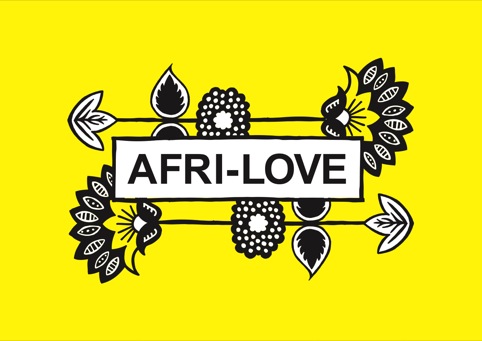
What challenges did you face/overcome in getting into the industry and achieving your ambitions?
It’s really important for me to do work whose subject I’m passionate about and, starting out, I didn’t always have this opportunity. In fact, there was a point where I was about to give up on design altogether, primarily for this reason. Making the decision to be self-employed was scary, for obvious reasons, however, the prospect of having more control over the projects I would work on, was very exciting… and has been very satisfying. It’s one of the best decisions I’ve made.
In my personal experience, my background has never really felt like a barrier to getting into the industry and achieving my ambitions. However, as a company operating in the UK, I sometimes wonder if people’s perceptions of Asilia preclude us from winning certain projects. A lot of our work has had an African focus and my business partner and I are of Kenyan origin so, I think that some people assume that we only work on Africa-related projects. So this is the current challenge that I’m/we’re facing and the approach at the moment is to continue to focus on doing great work. I believe that we will continue to attract the kind of people that we enjoy working with.
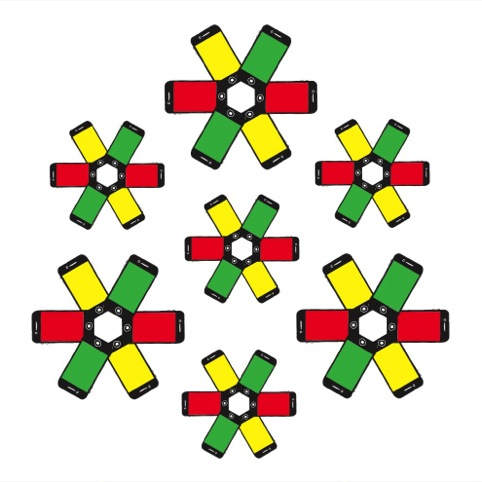
Who and/or What are your greatest inspirations and influences?
I’m greatly inspired by craft traditions from around the world. I always find joy in the diversity of textiles, patterns, adornments and vibrant colour combinations and I aim to capture that same excitement in my work.
Discovering Chaz Maviyane-Davies was very inspiring and in particular, his insistence that design should express the context within which it’s created, in terms of speaking to its culture and not just emulating a Western ideal.
Marian Bantjes is another big inspiration. I love the playfulness, intricacy and amazing level of craftmanship in her work, as well as her sass and confidence!
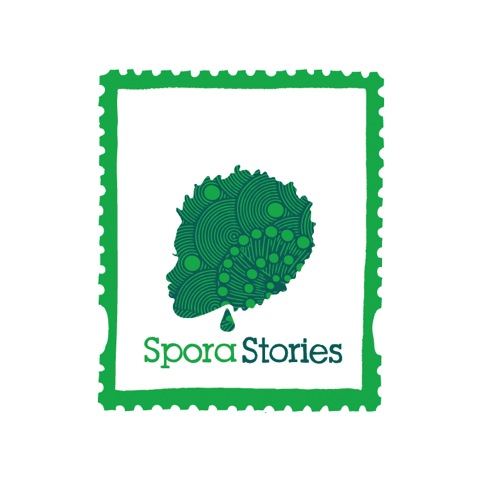
What is the project you are most proud of?
This is such a difficult question and the answer constantly evolves. One of the projects I’m most proud of is the work we did for the Film Africa festival. It was great to have such a visual project, in terms of our work being seen all over town and, the response we’re still receiving now, from different people, is really positive.
I’m also really proud of the work we did for the African Union Campaign for Accelerated Reduction of Maternal, Newborn and Child Mortality in Africa (CARMMA). Particularly, the iconography we developed and the infographics we designed which, help to make a serious subject much more accessible to a wider audience.
What would be your dream job or project?
I think I’m living my dream job right now. Dream project? I would love to work with museums and cultural institutions like the Southbank Centre.
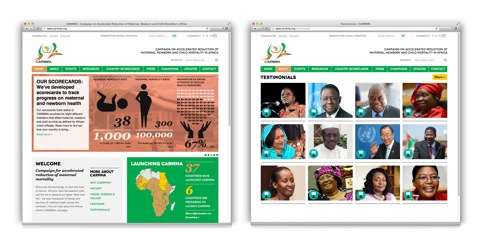
Please name some people in your field that you believe deserve credit or recognition, and why.
I’ve lately come across quite a few small, independent agencies in Africa that are doing some exciting work. In Kenya (and I believe this may be true for other countries on the continent), international advertising agencies (e.g. TBWA, Ogilvy etc.) have a kind of monopoly when it comes to the communications/design industry. It’s refreshing to see these smaller, and often much more creative, shops emerging and doing well.
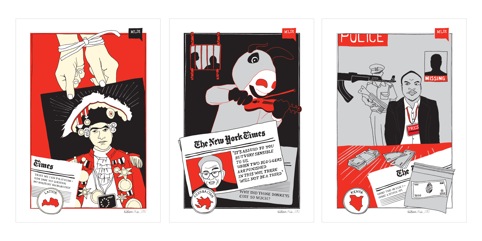
What’s your best piece of advice for those wanting to follow in your footsteps?
Get as much experience as you can, start as early as you can and be creative about how you find it. There is a lot of competition in our field so don’t expect a long list of design internships and work placements for you to choose from. Think outside the box. I got one of my first opportunities by attending a networking event that had nothing to do with design, meeting a publisher and volunteering my services for his up and coming magazine.
Another important thing – never underestimate the value of experimentation and play. Some of the best ideas come from that.
What’s next for you?
Asilia is working on developing some design and digital products. Look out for our online shop and a couple of app launches in the next few months.
Network:
THE U.S:
AFRICOBRA: Art & Impact honours the Chicago artist group, AfriCOBRA (African Commune of Bad Relevant Artists). Exhibition is presented by 3 South Side institutions and runs from 26 July until 29 September 2013. For more information, go to http://www.dusablemuseum.org/events/details/africobra-the-dusable-museum-programming
THE CARIBBEAN:
Belize International Film Festival. This is the eighth edition of the festival focusing on films from the Caribbean and Central America. Date: July 11-15, 2013. For more information visit www.belizefilmfestival.com
EUROPE:
Design On Stage exhibition presents the best product innovations of the year. Red Dot Design Museum, Gelsenkirchener Straße 181 45309 Essen, Germany. Exhibition runs from 2 – 28 July 2013. For more information visit http://en.red-dot.org/5005.html
AFRICA:
Durban International Film Festival 2013. Hosted by the University of KwaZulu Natal’s Centre for Creative Arts, the Durban International Film Festival will be celebrating its 34th edition from 18 to 28 July 2013. For more information on South Africa’s premiere film event visit www.durbanfilmfest.co.za
——————————————————————————————————————————————————————————————————————————-
Jon Daniel is a London-based Independent Creative Director, Designer and Curator. For more information visit his website at www.jon-daniel.com | or his blog at www.visual-intellectual.com
——————————————————————————————————————————————————————————————————————————-
-
Post a comment




